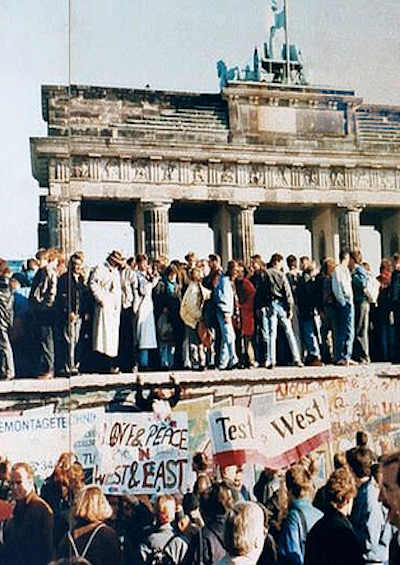Europe: A New Geopolitical Tax?
How best to cope with an era of new divisions in Europe.
January 1, 2015

Twenty-five years after the fall of the Berlin Wall, new divisions are becoming apparent on the European continent. This is likely to impose significant costs. In so doing, it threatens to reverse the so-called peace dividend which we have come to take to take for granted over the past quarter century.
Lower defense expenditures, paired with the normalization of trade and investment flows, helped many countries in emerging Europe not only get through very difficult recessions in the early 1990s. Equally important, it also helped them weather the spillovers from the Russian financial crisis in 1998.
Fiscal consolidation in Central and Eastern Europe after the global financial crisis was facilitated by yearly defense savings of at least 1-2% of GDP, compared to what these countries would have had to spend had they not been NATO members.
Alas, that peace dividend, crucial as it proved to be during the long years of economic transformation, has now turned into its very opposite – a geopolitical tax. That tax, thankfully, is not yet at the levels we got used to during the Cold War, but it is still bound to be substantial.
Russia sets the pace. It is now spending at least 5% of GDP on defense – and Ukraine has announced that it wants to double defense spending relative to GDP, to reach the 4-5% range as well by 2020.
Many of the new NATO members in emerging Europe, who until now have essentially been free-riding on the alliance’s collective defense commitment, have declared their aim to meet the 2% obligation for the defense budget. These increases may seem small, but are significant, especially given the tightness of public spending everywhere.
Trade: From uniter to divider again
Equally important, the new divisions seizing Europe are once again beginning to distort trade and investment. Most immediately, this manifests itself through sanctions and counter-sanctions, but the spillovers to non-targeted sectors and individuals are very real. What economists call “aggregate or systematic uncertainty,” or uncertainty about the rules of the game, is clearly on the rise.
This “geopolitical tax” is not limited to the trade and defense arenas. It shows up as well in the increasing emphasis on redundancy in the various key systems on which the modern economy relies – most notably in the financial sector, but also in energy.
No one in Europe needs to be reminded of the renewed importance of energy security. Energy security has always been very important in the minds of policymakers in emerging Europe. This concerns demand security for producing countries as well as supply security for the importing countries.
Energy (in)security as another tax
Increasingly, we see countries keen on trying to diversify their supply channels. The problem is that national responses are often highly inefficient and sometimes directly counter productive.
What we need are responses at the regional level – and potentially even at the global level. In practical terms, that means investing in better interconnections between various national systems and encouraging much more cross-border cooperation in the energy area. The commitment of the new European Commission to pursuing an energy union is highly encouraging.
Progress on this crucial front will be costly, as huge investments are needed in the energy sector, and not only in emerging Europe. The Paris-based IEA has estimated an investment need totaling $2 trillion over the next 20 years, with two-thirds of that amount expected to be needed in emerging markets.
To be sure, the current geopolitical uncertainty is not helping reduce overall risk levels. Irrespective of that fact, energy projects do have their own specific risks. The main problem is not the availability of finance, but rather the pipeline of well-prepared, bankable projects.
Two factors stand out in this regard: First, the absorption capacity of emerging markets is not yet sufficient. And second, it is often difficult to encourage bidders to invest in project preparation when they do not know whether they will win tenders or not.
The biggest constraint, though, is often policy risk, or – more specifically – the risks associated with political volatility and changes in the legal and regulatory frameworks. These risks are very large in emerging markets, but they are also considerable in advanced economies.
A role for international financial institution
International financial institutions can play a vital role in helping to mitigate these risks. They do so mainly by providing “political cover” for investment projects. Valuable as that is, it is important to realize that such a cover cannot provide an ironclad guarantee.
Viewed over the medium and long term, the main contribution of IFIs is their capacity to promote reforms and help improve the general business environment.
Unfortunately, the record in emerging Europe is mixed. For an entire decade by now, much of the region has been held back by a lack of reform. Countries are “stuck in transition,” often as a result of weak political institutions and strong vested interests.
While the main responsibility for reform is a domestic one, IFIs can help countries get out of these traps by working with private sector partners and governments. They can also promote regional solutions, e.g., encouraging the interconnectedness of energy systems and coordinating investments in storage facilities.
That is one more reason why energy security will become ever more important for IFIs. As geopolitical tensions escalate in Europe, and as the costs associated with those tensions become more taxing, it is all the more imperative to manage the underlying risks in a manner that is both future-oriented and sustainable.
Energy security can drive European integration
There are no guarantees, but it is possible that the renewed emphasis on energy security could provide a new momentum for integration within the European Union. The reforms needed to secure stability in energy supply will also help perfect the single market still suffering from the scars left by the global financial crisis.
What is crucial for the long-term prosperity of Europe is that such deeper integration does not result in new barriers being erected towards the east. Europe and Russia both need each other, and the current geopolitical tax is imposed on both.
Takeaways
New divisions in Europe are imposing a new geopolitical tax onto the continent.
After a 25-year pause, systemic uncertainty is once again beginning to distort trade and investment in Europe.
Energy insecurity is another tax imposed on Europe, but it could provide new momentum for integration within the EU.
Ultimately, Europe and Russia both need each other, and the current geopolitical tax is imposed on both.

